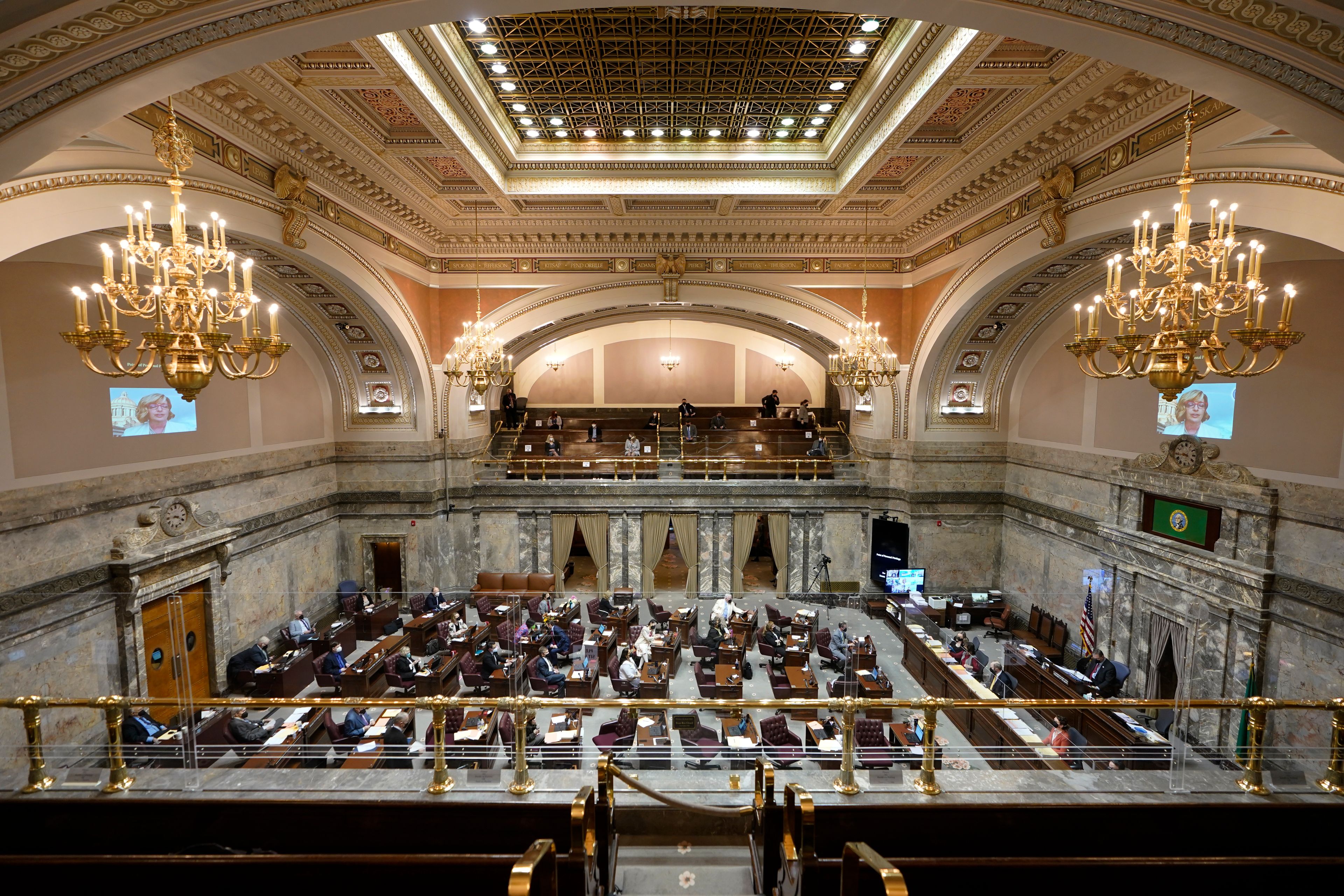A look at what lived, died during WA legislative session
Lawmakers approve a $64.2 billion supplemental budget before adjourning
OLYMPIA — Washington state lawmakers worked until nearly the last minute this week, adjourning their 60-day legislative session shortly after approving a $64.1 billion supplemental state budget.
Lawmakers adjourned just before midnight Thursday, the last day of session, after taking final votes on the adjustments to boost spending on the current two-year budget that runs through mid-2023 by $5 billion.
Like last year, much of the session was done in a hybrid fashion, with some lawmakers on the floor and some participating remotely because of the COVID-19 pandemic. The numbers of lawmakers allowed in each chamber increased throughout session as COVID-19 cases dropped in the state, and the public was once again allowed into the public galleries overlooking the chambers a few weeks ago.
After the Legislature adjourned, Gov. Jay Inslee credited lawmakers with delivering “big, bold, action” on areas ranging from budget spending to address homelessness to a transportation package that has a large focus on transit.
Democratic House Speaker Laurie Jinkins said, “I think we accomplished much more in a 60-day session than anyone would have expected,”
But House Republican Leader J.T. Wilcox expressed frustration on what he called a “closed process” on things like the transportation revenue package — which has been bipartisan in prior years — and on the lack of across-the-board tax cuts for the middle class considering the strong revenues the state has seen over the past year, not including the more than $1 billion in unspent federal pandemic relief funds used in the budget. While there was a tax cut for small businesses, calls for a cut to the state sales tax or property taxes were not included.
“I think people are generally aware that there was a ton of extra money out there and they didn’t get any of it,” he said.
Here’s a look at some other measures that passed, and some that did not.
TRANSPORTATION REVENUE PACKAGE: The nearly $17 billion, 16-year transportation revenue package spends on projects across the state, ranging from building new hybrid electric ferries and funding more walking and biking corridors, to highway maintenance and replacing fish passage culverts. Funding is also provided to ensure that those age 18 and younger can ride for free on public transportation.
POLICE REFORM: Washington’s ambitious package of police reform legislation, adopted last year in the wake of 2020’s national uproar over George Floyd’s murder, needed clarifying. Aspects of the reforms left police uncertain over whether they could detain people who flee investigatory stops, whether they could use force to bring people in crisis to get mental health help, and whether they could still use less-lethal beanbag shotguns, which seemed to be accidentally prohibited by the wording of a ban on military weapons for law enforcement. Lawmakers this year passed bills answering each in the affirmative, over objections from police accountability groups who did not want to give officers the ability to use force during investigatory stops. Another measure, loosening restrictions on police car chases, stalled in the Senate on the final day of session.
DELAY TO LONG-TERM CARE PROGRAM: Lawmakers moved quickly to delay and make some adjustments to the state’s new long-term care program. Inslee signed the measure into law at the end of January, which means that the payroll tax that was supposed to start being collected by employers in January is delayed until July 2023, and access to the benefit to pay for things like in-home care, home modifications like wheelchair ramps and rides to the doctor is now delayed from Jan. 1, 2025, until July 1, 2026. Lawmakers also allowed people born before 1968 who are not fully vested in the program to qualify for partial benefits. The lifetime maximum of the benefit is $36,500, with annual increases to be determined based on inflation. Supporters say the program is critical, and that most people will need help with long-term care at some point in their life. More than 473,000 with private plans had already opted out of the program, so the delay gives lawmakers time to address long-term solvency concerns and address other criticisms about the benefit, including it’s lack of portability if someone moves out of state.
CAP ON INSULIN COSTS: The cost of a 30-day supply of insulin will drop to $35 for one year, starting next year, under a measure Inslee signed into law last week. The current out-of-pocket limit for a 30-day supply of insulin has been $100 since January 2021, under a law passed by the Washington Legislature in 2020. That law is set to expire on Jan. 1, 2023, which is when the new law takes effect. The new limit and extension, which ends on Jan. 1, 2024, is meant to give more time for a work group created in 2020 to finish its work to come up with a long-term solution for insulin costs.
GUN RESTRICTIONS: Lawmakers approved the prohibition of the manufacture, distribution and sale of firearm magazines that hold more than 10 rounds of ammunition, legislation that was requested by Democratic Attorney General Bob Ferguson. They also passed a measure that prohibits weapons at ballot counting sites and school board meetings across the state. That bill also bans openly carried firearms at local government meetings and election-related facilities like county election offices, though people who have concealed pistol licenses would be allowed to carry their concealed weapon.
MOTION PICTURE INCENTIVE. In an effort to lure more projects to the state, lawmakers voted to expand the state’s incentive program. The bill increases the total amount of tax credits for productions from $3.5 million a year to $15 million. It also raises the maximum tax credit for an individual project from $750,000 to $1 million a year.
DIED:
GUBERNATORIAL POWER REFORM: It’s been more than two years since Inslee declared a state of emergency due to the COVID-19 pandemic, and Republicans pushed to limit the amount of time a declaration could stay in place without legislative approval. A Senate measure, sponsored by a Democrat, authorized legislative leaders to terminate an emergency after 90 days if the Legislature is not in session. Republicans said it was a watered down bill that wouldn’t have done anything, and even Inslee said it wouldn’t affect the state’s COVID-19 response after the bill passed the Senate. The measure was brought up for a vote during an overnight session in the House but Democrats ultimately pulled the bill shortly after debate started.
ELECTION LIES: A bill sought by Inslee that would have made it a crime for elected officials or candidates to knowingly lie about election outcomes if those claims result in violence passed a Senate committee but was not brought up for a vote from the full Senate.
MISSING MIDDLE HOUSING: Another priority of the governor’s, a bill to expand where housing supply like duplexes and other types of “middle housing” could be built, died in the House. Another bill to boost accessory dwelling units like backyard cottages statewide cleared the House but died in the Senate.
ELECTRIC CAR REBATE: Senate and House budget writers did not include money for a proposal by the governor to offer rebates of $7,500 for new electric vehicles and $5,000 for used ones.
RENT INCREASES: A bill that would have required a landlord to give a tenant six-month notice for any rent increase of 7.5% or higher cleared a House committee but was never brought up for a floor vote.
REDISTRICTING TRANSPARENCY: A measure that sought to create more transparency around the state’s redistricting process following last year’s chaotic final hours of work that led to complaints its deliberations may have violated open meetings laws unanimously passed the Senate but died in the House. The measure would have required the redistricting commission to make plans publicly available 72 hours prior to voting, and that any amendments be debated and voted on publicly.
SYNTHETICALLY DERIVED THC: Since Congress authorized hemp-growing in the 2018 federal Farm Bill, processors around the country have exploited a perceived loophole to extract CBD, a non-impairing compound, and chemically convert it into impairing THC, which has been sold without regulation or age restrictions at gas stations, convenience stores and vape shops. At least 17 states have taken steps to ban such sales, but dueling efforts in the Washington Legislature failed this year amid disagreement over how much authority the Liquor and Cannabis Board should have – and whether the synthetically derived THC should be allowed in Washington’s legal cannabis stores.
__
AP writer Gene Johnson contributed from Seattle.






